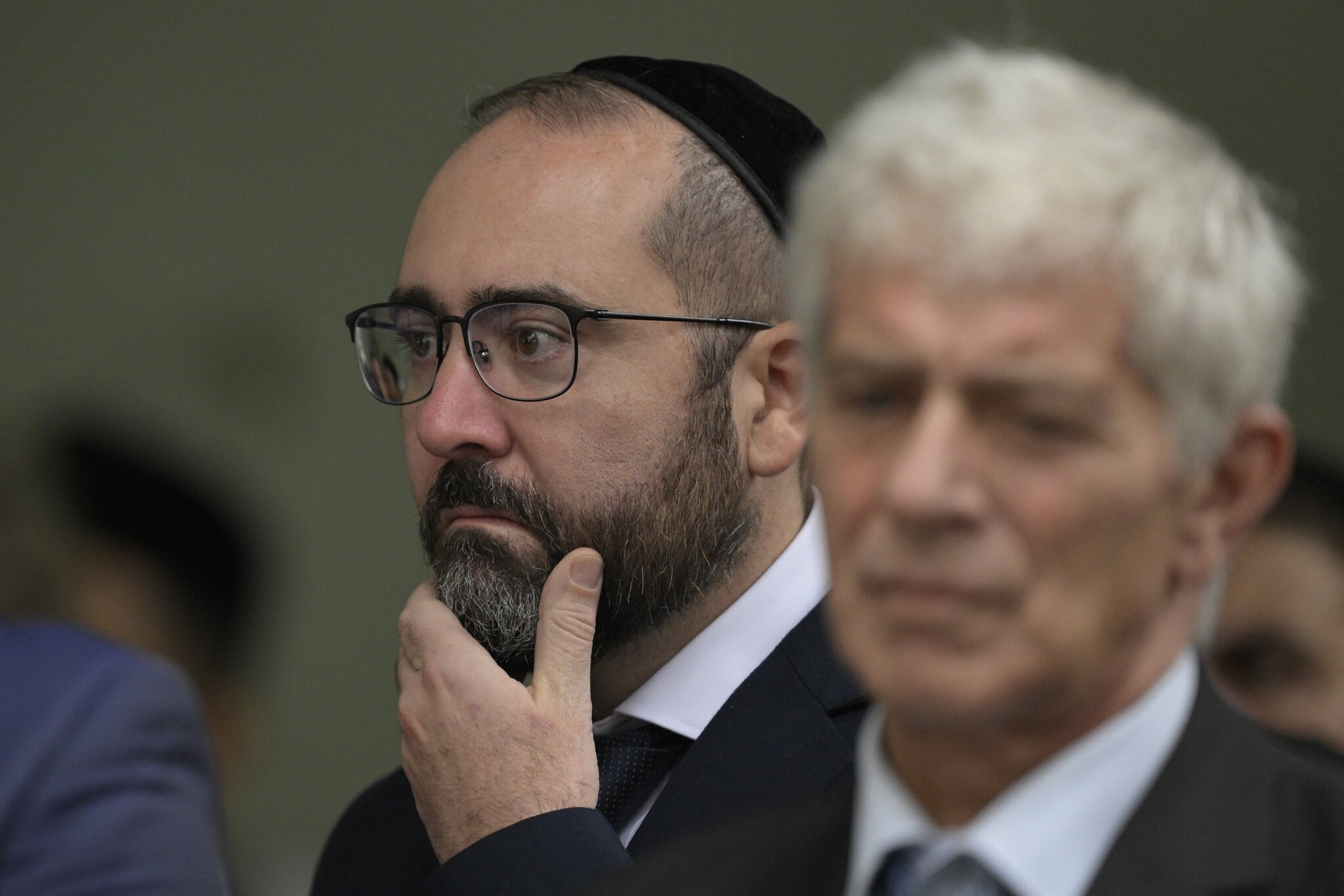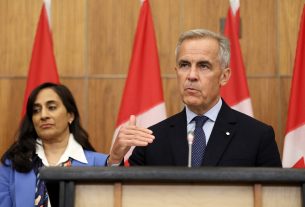BUENOS AIRES, Argentina (JR) — Argentina’s senate is on the brink of confirming President Javier Milei’s nominee to be ambassador to Israel: his personal rabbi, Shimon Axel Wahnish.
Wahnish, 42, has been close to Milei as the Catholic “anarcho-capitalist” made a meteoric rise to power and is widely understood to be responsible for Milei’s recent philosemitism, which shaped his candidacy and first months as president.
If confirmed, Wahnish will move from Buenos Aires to Israel with his family — his wife and six children — but it’s unclear whether he will land in Herzliya, where Argentina’s embassy has been located. Milei has vowed to move the embassy to Israel’s contested capital city of Jerusalem.
Wahnish’s approval has encountered snags amid concerns about Milei’s embassy move and after a testy hearing last month that elicited charges of antisemitism from prominent Argentinian Jews.
“You must be aware that you are not the ambassador of Israel in Argentina. You are the ambassador of Argentina in Israel,” said one lawmaker, Lucia Corpacci, in an admonishment that carried with it hints of dual-loyalty allegations like those that have plagued Jews around the world for centuries.
“Why do Jewish Argentines have to clarify that we are Argentines?” tweeted a lower-chamber lawmaker, Sabrina Ajmechet. Argentina’s Jewish political umbrella organization, DAIA, said in a statement that it “strongly repudiates the prejudiced expressions” by Corpacci.
Another lawmaker, Martin Lousteau, raised concerns that the planned embassy move could harm Argentina’s future claims to the Falkland Islands, territories that, like Jerusalem, have faced competing claims of sovereignty, in this case between Argentina and Britain. “We are not going to put the embassy in an occupied territory,” Wahnish said in response to the senator, who has long drawn criticism from Jewish groups for what they say is a poor understanding of Middle East affairs. Last week, Foreign Minister Diana Mondino reportedly convinced Lousteau to sign off on Wahnish’s nomination after personally assuring him that Argentina’s claim to the Falklands would not be affected.
Now, Wahnish is expected to secure confirmation, which would position him to become, according to Israel’s foreign ministry, the only rabbi in history to serve as an ambassador to Israel. (The role has been vacant since early 2022 when the previous ambassador was removed following a corruption conviction.) In his role, Wahnish will be responsible for maintaining newly improved relations between Argentina, home to the sixth-largest Jewish community in the world, and Israel.
Argentina’s President Javier Milei, right, cries with Rabbi Shimon Axel Wahnish during a visit to the Western Wall in Jerusalem’s Old City on Feb. 6, 2024. (Ronald Schemidt/AFP via Getty Images)
It’s a responsibility that the rabbi likely could not have anticipated growing up in Buenos Aires where, according to the haredi Orthodox magazine Mishpacha, he was not raised in Orthodoxy but became drawn to it as a young adult. After graduating from high school, Wahnish studied in yeshivas in Israel for a few years before returning to Argentina and getting a degree in education.
According to a resume submitted to the senate following his nomination as ambassador, Wahnish embarked on a series of Jewish outreach and education initiatives, including leading a program for young adults, founding a kabbalah study institute and working with Jews living outside Argentina’s major population centers.
In 2012, he became the chief rabbi of ACILBA, Argentina’s official Moroccan Jewish community. In that role, his resume says, he has been “in charge of the diplomatic link with Morocco, Egypt and the United States” and also certifies Argentinian applicants for Spanish and Portuguese citizenship as part of those countries’ process of making reparations to the descendants of Sephardic Jews expelled during the Inquisition.
The ACILBA community is headquartered in a historic synagogue in central Buenos Aires that was built more than a century ago by Jewish immigrants of Moroccan origin, who arrived in Argentina in large numbers starting in 1891. The Great Temple of Piedras Street, also known as Bet El, hosted Albert Einstein during his 1925 visit to Argentina, but in recent years it had trouble filling its pews with the community in decline. According to Mishpacha, Wahnish’s arrival brought new energy to the synagogue — and in the last decade, ACILBA has added another location in the trendy neighborhood of Palermo Soho. It is there that Wahnish has worked every day.

Interior of the Bet El Sephardic synagogue in Buenos Aires. (Horacio Literat/ACILBA, the Moroccan Jewish Association of Argentina)
It was through ACILBA that Wahnish first encountered Milei just a couple of years ago, when the economist was still a fringe political figure known for making outlandish statements on TV but not seen as a likely contender for national office. According to Argentine political lore, Milei sought to speak to Wahnish’s group in part to remediate the perception that he was antisemitic. First, he had to sit down with Wahnish — and their pro forma meeting stretched for hours.
“Little is known about what transpired behind closed doors, but when Milei left the office, a brotherhood had been born,” according to an account in Mishpacha. “Rabbi Wahnish was accepted into Milei’s inner circle, until then occupied only by his sister, Karina (to whom he refers as the Boss). From then on, Milei, whose popularity was growing at an unprecedented rate, proclaimed to every microphone thrust before him that Rabbi Wahnish was his guide and spiritual mentor.”
Even as Milei’s popularity skyrocketed, he became a regular at the rabbi’s classes in the synagogue. Behind the scenes, Milei began joining the Wahnish family for Jewish holidays. And in public, he was forthcoming with praise for Wahnish, often in starkly emotional terms.
Milei infused Jewish practices into his campaign and began walking on stage to the sound of a shofar. He became emphatic about relocating the embassy, a politically significant gesture that only a handful of countries have made and that would mark a stark departure from Argentina’s historically checkered relations with Israel. And he began saying that he hoped to become Jewish one day, though he said he did not see Jewish observance as compatible with the requirements of the presidency.

Javier Milei, who was elected president of Argentina in November 2023, visits the grave of the Lubavitcher rabbi in Queens, New York, Nov. 27, 2023. (Courtesy Chabad)
Soon after he was elected, Milei traveled to New York City to pray at the grave of Rabbi Menachem Mendel Schneerson, the last leader of the Chabad-Lubavitch movement. And to accompany his inauguration, Milei opted to hold an interfaith ceremony rather than the Catholic rites traditionally associated with the swearing-in, in part to make space for his friend Wahnish.
There, inside Buenos Aires’ main Catholic church, the rabbi addressed Milei directly.
“Mr. President, I was asked to bless you. But … I’m not the one who gives blessings. We are all humans and in front of God we are all equals,” Wahnish said during the nationally televised ceremony.
“The only thing that I can do is to ask God … to give you, dear president, exactly what you have been asking God for a long time,” Wahnish continued. “Do you remember what it is?”
Milei responded by mouthing three words: “wisdom, temperance and courage.” Then the two men embraced for a long time.
Since Milei’s swearing in, Wahnish has continued to stay close to him, including during a three-day trip to Israel that was Milei’s first trip abroad as president. There, Milei visited the Western Wall and the Yad Vashem Holocaust memorial and met with Israeli leaders, including President Isaac Herzog and Prime Minister Benjamin Netanyahu. Milei attracted notice for his emotional reaction to being in the country, when he made official the embassy relocation plan.

Rabbi Shimon Axel Wahnish attended an Argentina-Israel Chamber event at the Intercontinental Hotel in Buenos Aires on Dec. 14, 2023. (Juan Melamed)
“People used to think that a president is above other people, not human. We want to show that everyone has emotions and still grows spiritually and to be a better person,” Wahnish told the Jerusalem Post about the trip, in one of his only interviews about his relationship with Milei. Wahnish declined to speak with JR, saying in December that he wanted to keep a low profile.
Argentina’s relationship with Israel could be one of the least divisive aspects of Milei’s new presidency. Allying with Israel represents a shift from his predecessor, like many Latin American leftists a strong critic of Israel. Milei is eliciting more controversy with his economic policies, austerity cuts to the government and alliances with far-right leaders around the world, including former U.S. president and presumptive Republican nominee Donald Trump.
For Wahnish, the move to Israel comes at a personally meaningful time, after a family crisis in which his wife and youngest daughter barely survived a traumatic birth right around the time he met Milei, according to Mishpacha. His brother Hernan, also a rabbi, will take up his responsibilities at ACILBA.
Diana Serfaty, ACILBA’s president, told the Jewish Telegraphic Agency that the mood in the community is a mix of pride for Wahnish’s new role and also some sadness.
“While it won’t be easy to say goodbye to his daily presence, we also know that it will be a gradual process and that he will remain in contact with the community as a guide and mentor to his eventual replacement,” Serfaty said. She added, “We wish him the best and we know that he has important tools for his role due to his training, empathy, entrepreneurial spirit and proactivity.”




